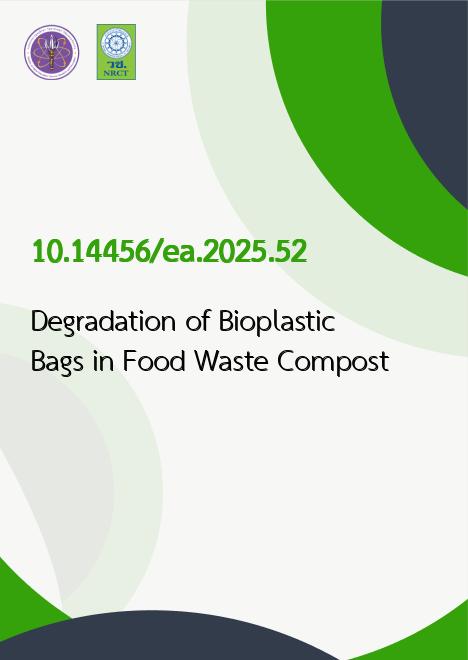
|
Degradation of Bioplastic Bags in Food Waste Compost |
|---|---|
| รหัสดีโอไอ | |
| Creator | Nuta Supakata |
| Title | Degradation of Bioplastic Bags in Food Waste Compost |
| Contributor | Puangphaka Kaewtin, Nuta Supakata, Pathompong Vibhatabanthu, Sarawut Srithongouthai, Vorapot Kanokkantapong |
| Publisher | Thai Society of Higher Education Institutes on Environment |
| Publication Year | 2568 |
| Journal Title | EnvironmentAsia |
| Journal Vol. | 18 |
| Journal No. | 3 |
| Page no. | 74-88 |
| Keyword | Biodegradable plastic, Bioplastic, Food waste composting, FTIR spectroscopy |
| URL Website | http://www.tshe.org/ea/index.html |
| Website title | EnvironmentAsia |
| ISSN | 1906-1714 |
| Abstract | This study assessed the degradation of bioplastic bags in food waste composting under aerated and non-aerated conditions across laboratory and pilot scales using food waste combined with organic fertilizer as a bulking agent. The bioplastic bags, made from compostable polybutylene adipate terephthalate (PBAT) and polylactic acid (PLA), were analyzed using Fourier transform infrared (FTIR) spectroscopy with a total attended reflection technique (ATR). The results indicated the emergence of hydroxyl (HI) functional groups at 3285 and 3274 cm-1 and alkene (CI) formations at 1634 and 1548 cm-1 and 1633 and 1540 cm-1 for laboratory and pilot scales, respectively, confirming ester bond hydrolysis and oxidative polymer chain scission. Statistical analysis demonstrated significantly elevated carbonyl and hydroxyl indices throughout the composting duration in laboratory and pilot scales, indicating polymer structure breakdown in the bioplastic. Optimal degradation occurred under aerated conditions with mechanical preprocessing, accelerating microbial accessibility to polymer surfaces. Pilot scale experiments exhibited enhanced initial decomposition rates compared to controlled laboratory environments. These findings establish PBAT/PLA biodegradable bags as environmentally viable substitutes for conventional plastic in organic waste collection systems, facilitating integrated food waste-to-compost conversion while mitigating persistent plastic accumulation in ecosystems. |